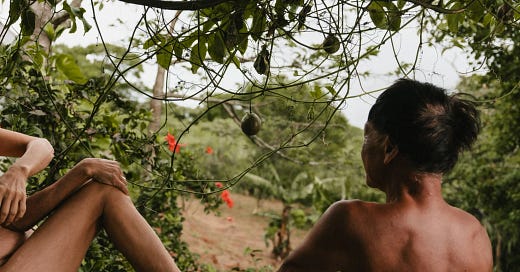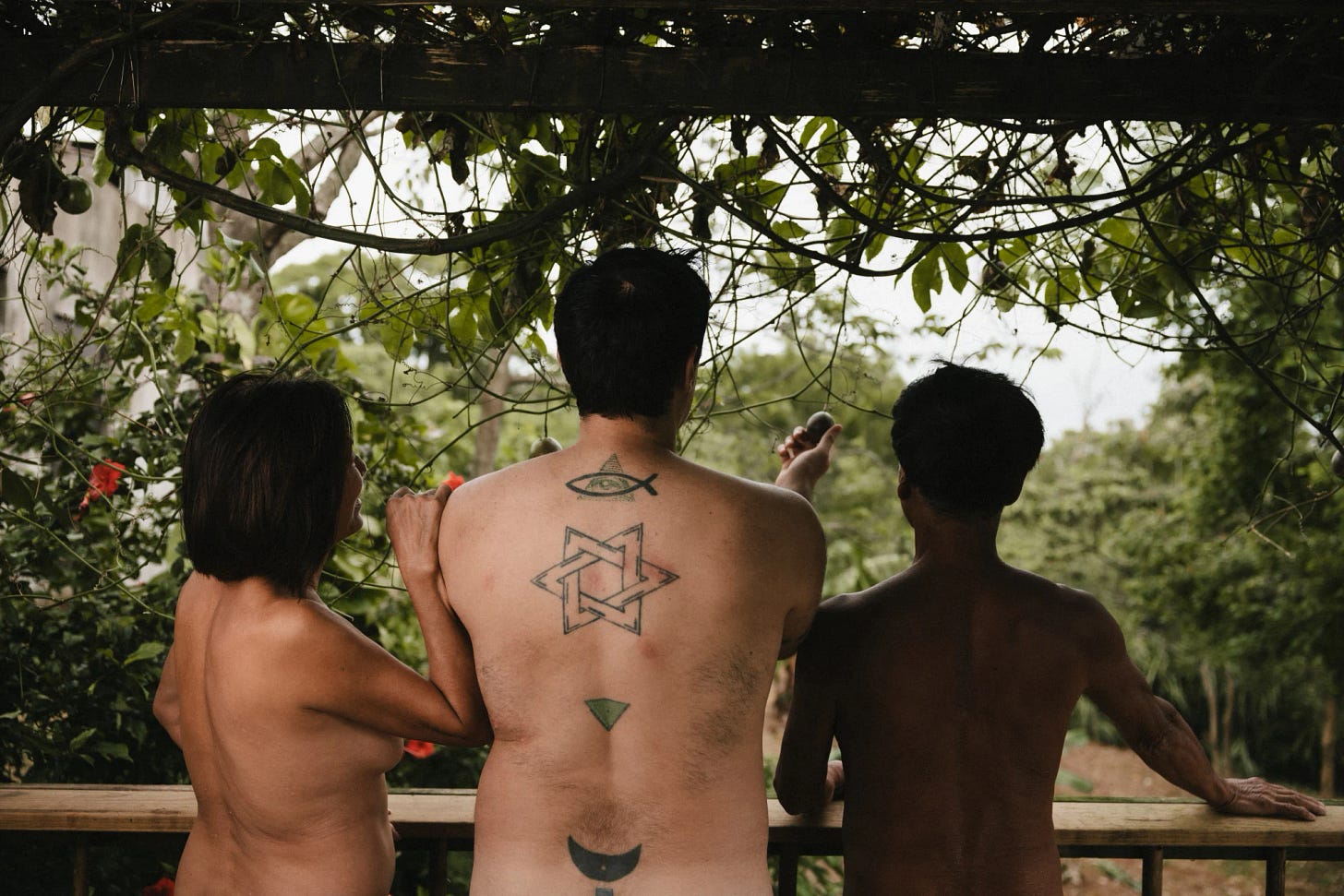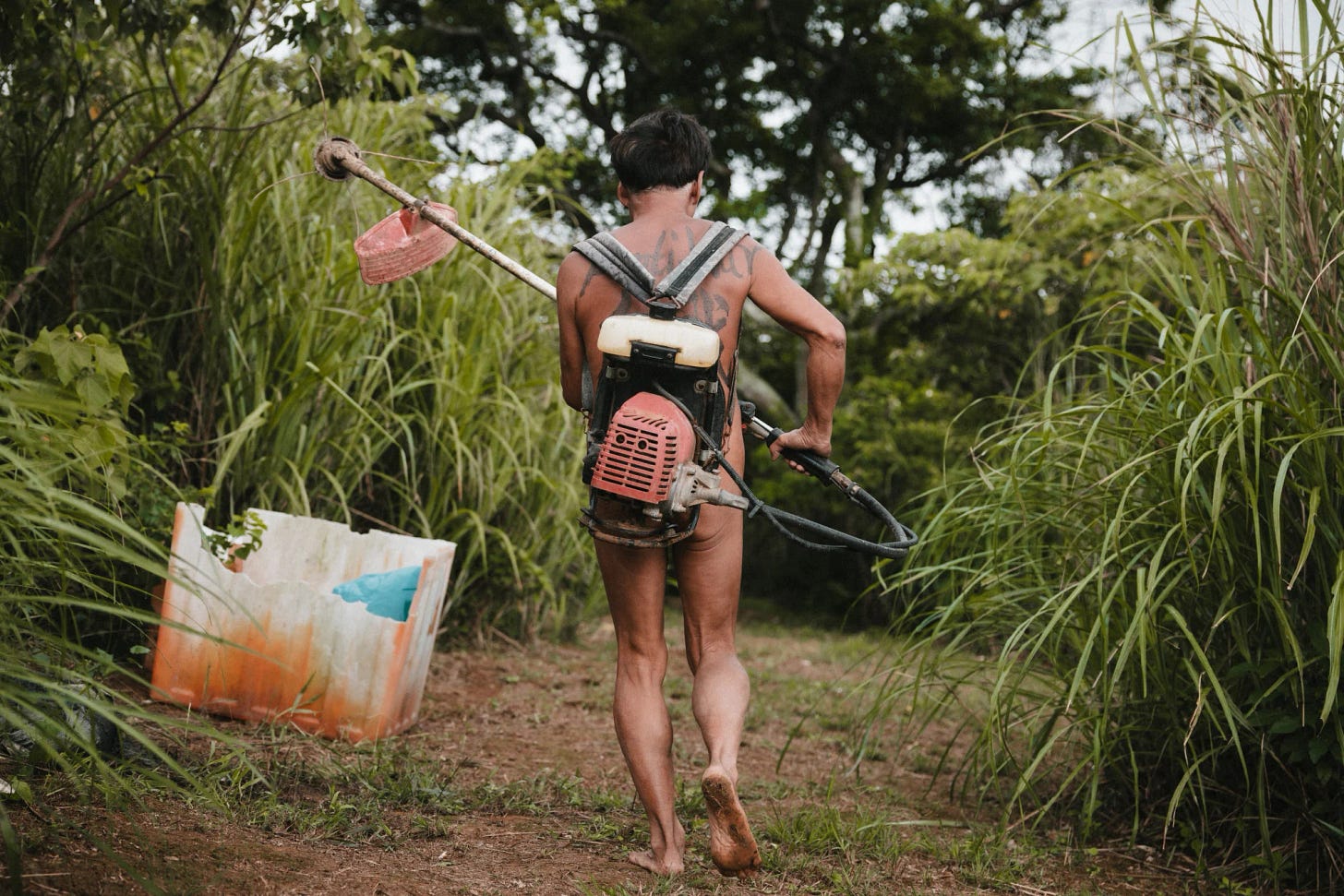South China Morning Post: Taiwanese naturists defying social and legal norms while nurturing body positivity
‘Freedom’: the Taiwanese naturists defying social – and legal – norms while nurturing body positivity
Originally published in South China Morning Post
Strictly speaking, public nudity is against the law in Taiwan. But one group holds monthly events where they can bare all without outside interference
In the mountains of Miaoli county, about an hour-and-a-half drive from Taipei, a group of friends have rented out all eight bedrooms and the lobby of a bed and breakfast. It’s a fairly remote area of Taiwan, surrounded by forest and 40km (25 miles) from Miaoli’s central railway station.
It’s where the group can embrace nature without any interference from the outside world, and here, that’s important; because here, everyone is naked.
Strictly speaking, public nudity is against the law in Taiwan, as it is, for the most part, in the rest of Asia. And while Taiwan is known to be among Asia’s most progressive places – it voted in the island’s first female president in 2016 and legalised same-sex marriage in 2019 – there are no private nude resorts or nude beaches, although there are some hot springs where nudity is allowed.
Naturism – as the practice is known – is more common in Europe, where Freikörperkultur (“free body culture”) has been an accepted and celebrated part of German society since the late 19th century.
— Retiree Julia Fu and farm owner Tom Yang at Yang’s farm in Sanzhi, Taiwan. Photo: Brian Wiemer
In Britain, and in other parts of the world, the term naturist is usually preferred over nudist, because the former also encompasses a love of nature.
According to the International Naturist Federation, headquartered in Austria and the largest such organisation in the world, naturism “isn’t sexual” and is rather “a way of life in harmony with nature characterised by the practice of communal nudity with the intention of encouraging self-respect, respect for others and for the environment”.
In Taiwan, naturists call themselves tiāntǐ in Mandarin, meaning “celestial bodies”, and organise activities using their Line social-media app group “Return to Nature”, which currently counts 260 members.
The subculture was introduced to the island in the mid- to late 2000s and flourished as social media allowed people to network online.
The group’s events are held monthly and range from dozens of people meeting in rented spaces to small house parties of fewer than 10 people.
Members so far are all Taiwanese, with the confidential group chats written exclusively in Chinese – today’s Miaoli attendants have organised their au naturel retreat through Line.
The group’s moderator is fifty-something Keven Liao Tian-wei, from the southern port city of Kaohsiung, who describes himself as a semi-retired auto-parts dealer.
He first connected with the group “out of curiosity, and I fell in love with it after joining about 10 years ago”, he says.
“The original organiser stopped holding events for some reason, so our friends who lived in the south met for a party, and as a result, I started these activities. Naturism has been in Taiwan for at least 20 years and I believe it will continue. Even if one day I don’t host it, younger people will come forward to take over.”
— Fu in a forest pathway at a farm in Sanzhi, Taiwan. Photo: Brian Wiemer
While naturism can seem, at first, well, unnatural, after a while with the group in Miaoli, one forgets that no one is wearing any clothes. Today, about 20 men and 10 women attend, aged in their 30s to 70s.
Bare breasts and genitals are exposed, yet people speak to each other casually, lounging on sofas, cooking together in the kitchen or singing karaoke.
Everyone is here to have fun, but there are rules. No photos are to be shared online without consent, and if any are, faces are blurred. Sharing pornography is prohibited and violators will be removed from the Line group.
Liao also enforces rules forbidding public displays of sexuality, and he emphasises that harassment of female members is not allowed. Men often outnumber women at these events, so he does his best to make sure women feel comfortable and safe.
Return to Nature members are also required to attend at least one party every two months, in an attempt to keep out any interlopers.
— Peter Chan and Fu take cover from the rain under a canopy at a farm in Sanzhi. Both are sporting anti-war body paint. Photo: Brian Wiemer
Most of the women at the Miaoli event arrive with their husbands and the majority of attendees are couples, with several single men but few single women.
One couple is playing the saxophone, and Stephen Chang Tai-sho, from Taipei, is happy to introduce me, the only foreigner in the group, to his wife, Yen, and talk about their experiences with naturism.
An engineer and amateur musician in his late 60s, Chang “discovered naturism on the internet”, he says. “I liked it, so I researched it. I went to a nude beach in Florida the first time I visited there. I found this group on Twitter, and if we have a meeting, I will show up.”
Asked what he likes most about the lifestyle, he responds, just as several others do, that it’s simply the “freedom”.
I first attended one of the group’s events in 2023, at a hot-spring hotel in Wulai, in New Taipei, at a meet-up organised by Julia Fu Yong-en, a retiree in her 60s.
Hot-spring culture is popular all over Taiwan, but is usually gender-segregated. It may be traditional to go nude, but hot-spring locations will either separate men and women or require bathing suits in public spas.
However, that doesn’t stop some from renting out a hot spring for a private party and using it however they like.
Along with Liao, Fu has been organising activities for the group for the past decade. “I went river tracing [a combination of hiking, swimming and rock climbing] with friends 10 years ago,” she says. “I liked swimming, but the first time I wasn’t naked. The second time I enjoyed a waterfall, and took off my clothes. The men were respectful.”
— Yang leans on a gate at his farm in Sanzhi. Photo: Brian Wiemer
She also spends much of her time at a farmland location in Sanzhi, north of Taipei, where some of the Return to Nature members have created their own unofficial nudist resort.
A small isolated farm full of chickens and vegetables, it hosts gatherings on weekends for meals and sunbathing. It was a sunny day when I visited, and the outdoor shower was refreshing.
There I met Tom Yang Hai-yang, who runs the farm. He spoke of his brother, Lu Yi, who owned the property and died in June 2023 at the age of 103. Lu “was the pioneer of naturism here”, he says. “Since then, Julia and I have worked hard to create this place.”
Like many others in Taiwan, Yang first experienced social nudity abroad. “I was living in New York in 1992 and visited a nudist beach in New Jersey. I came back to Taiwan in 2010, and a friend told me about [the nudist] activities in the south of Taiwan, in Kaohsiung.
“The people are very friendly. When we meet up, everybody is like an old friend. It’s like déjà vu.”
— Fu, writer Ray Hecht and Yang admire the scenery at a farm in Sanzhi. Photo: Brian Wiemer
Tony Liu Chao-chun, a product designer from Taipei in his early 50s, joins Fu and Yang for lunch. He recalls his first experience of nudism: “I was studying Japanese in Japan, and I bought a magazine about hot springs,” he says. “I had some issues with my body, and I thought hot springs would help me become healthier, so I searched for it.
“When I went to the resort for the first time, the boss told me that in Japan we must be nude together. I was with strangers; I didn’t know them, but I learned to accept those customs.”
Back in Taiwan, he found like-minded souls on social media, and has been attending the Return to Nature meetings for several years.
Nevertheless, there are risks to becoming a naturist. EE Ruan Ren-zhu, an artist from Kaohsiung, is open about this part of her identity, which has caused some challenges.
She’s been featured in the Taiwanese media a number of times, sharing her story on multiple television shows and news outlets, but “most naturists don’t come out; they keep it a secret”, she tells me. “But when I do performance art, I am naked. So it was easier for me to be a naturist.”
The 65-year-old has been part of the naturist community since 2005. Unfortunately, not everyone in her family was accepting. “I came out to the newspapers, and TV. It’s hard for people to understand.
“My son, who was at university, told me, ‘How can I tell my girlfriend about you?’ I said, ‘That’s your problem, not mine.’”
The artist says she has always done things her own way. “My mother was a traditional woman. She worked so hard, and was so sad. It was the woman’s fate. I didn’t want to be like my mother. I wanted to be independent. I like the freedom.”
— Yang cuts the grass at his farm in Sanzhi, Taiwan. Photo: Brian Wiemer
Yet when asked about the future of naturism in Taiwan, she is not optimistic: “I don’t think it will become more acceptable.”
As I explored the community from the hot springs of Wulai to the mountains of Sanzhi and Miaoli, I couldn’t help but notice that most of the naturists are in the older demographic.
Many were retired, and at least over 50. While young people tend to be more open-minded and progressive, it doesn’t seem the younger generations are as interested.
There are, however, some exceptions. Born in the late 1980s, Anne Chen Hao-an is a millennial, and one of the youngest people at the most recent event I attended. As with many of the others I speak to, she first experienced social nudism abroad.
“I went to Berlin in 2008. I didn’t really join in any [naturist] activities, I just saw them. It’s their daily life – they sunbathe or they go swimming without clothing. That was a culture shock, but I thought it was good.
“The main idea is body positivity, which is more important for females. Because women are so self-conscious about their bodies, it’s hard for them, and I wish they could appreciate themselves.”
— Fu and Yang at a farm in Sanzhi. Photo: Brian Wiemer
People of all shapes, sizes and levels of attractiveness attend these events. If someone were to show up and expect to be aroused, they would likely be disappointed. But attraction is not the point.
Body positivity is about challenging social norms and accepting people regardless of perceived flaws, which is why these naturists are so comfortable in their own skin.
“We all play characters,” says Chen. “Clothing is like your weapon in society, but with nudity, you can take that away, and I think different kinds of bodies are beautiful.
“If people all looked the same, it would be so boring.”











nake sleep and nake working in summer time at home.....I saw people in Stockholm sunbathing their body and run around lakes half naked...